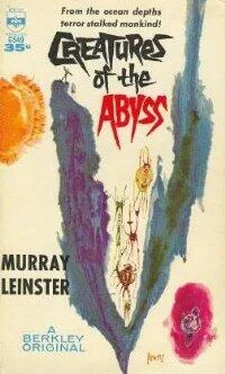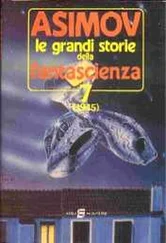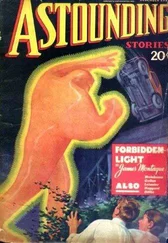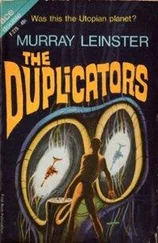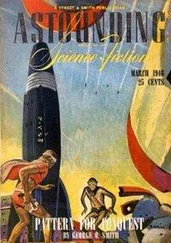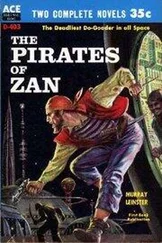Deirdre and Terry sat down as someone else said hotly, “Our observations were wrong. They had to be! The earth’s magnetic field couldn’t affect the speed of an object outside the atmosphere! Our observations say it slowed down. It couldn’t!”
Davis lifted a hand in greeting. The argument stopped for a moment Deirdre was known, but Terry had to be introduced. He was sitting beside a bald young man who explained in a low tone, as the argument resumed. “They’re having fun. They argued for days when our radar picked up an empty second stage in orbit They’re still ready to dispute for hours about a supposed retrograde satellite that was spotted last year, was watched for four turns, and then disappeared. Beer?”
“Too early,” said Terry. “Thanks just the same.”
Davis said earnestly, at the other side of the room, “I’d feel a lot better if that thing last night hadn’t splashed where it did.”
“The bolide,” said a voice humorously, “is a free animal.”
The discussion went on. Terry saw Deirdre talking to a middle-aged woman with a splendid sun-tan and a placid expression on her face. Doug and Tony sat watchfully on the side lines, listening. Doug had been offered, and had accepted, a sandwich. He ate it methodically.
Terry had a sudden feeling of unreality. Less than half an hour before he’d been in torment and, but for Deirdre, on his way to death. On the Esperance there’d been so much that was absorbing in the way of fish behavior that he’d forgotten some people were interested in other things. Here a dozen people squabbled over the behavior of a meteorite. Nothing could be of less consequence to the outside world. But in the outside world, people argued about baseball, or golf, or politics…
Doug excused himself and slipped outside. Terry joined him there a little later. Doug was smoking a cigarette, looking at the sky and the palms.
“Pretty heavy discussion,” said Terry.
“It’s over my head,” said Doug. “I got lonesome. It made me think of my girl. She likes to talk like this. That’s why…”
He stopped.
“Is there an aqualung oufit on the Esperance?” asked Terry.
“Sure! Two or three of them. Mr. Davis had an idea they’d be useful. Used one of them last week to look at the Esperance’s bottom-planks. Why?”
“I’d like to poke around the bottom of the lagoon a little,” said Terry, with unconscious grimness. “Would you help?”
“Sure!” said Doug.
They went back to the Esperance. Doug got out two aqualung outfits. They checked the valves and tanks and connections. Doug brought out two spring guns. In half an hour they were in the outboard, headed for what Doug said was the deepest part of the lagoon.
Arrived there, Terry tested the water with his finger and then went overside. Instead of a spring gun, he used one of the fish spears that seemed to be standard equipment for fishing, here. Doug stayed in the boat to watch.
Terry’d guessed that what he looked for would be in the deepest part of the lagoon. He was right. Within half an hour he’d speared five fish of types that had no business being within two thousand fathoms of the surface. He ignored the lagoon’s normal inhabitants. He picked on fish of a dark-red color, which is predominant in the depths but not elsewhere. When the fish had extremely small eyes or extremely large ones, he hunted them determinedly, knowing they were deep-sea fish. He caught five, which was a good haul, even considering his previous suspicions.
Doug inspected the catch as the outboard went back to the yacht. Terry replaced his spear under the gunwale.
“They’re queer fish,” observed Doug. “I wouldn’t want to eat them.”
“Neither would I,” agreed Terry. “But I feel a certain sympathy for them. I think we’ve shared an experience.”
He did. Fish so far from their normal environment would not have migrated unless they’d been forced to. So these fish must have been driven up from the blissful utter blackness of the abyss, which was their habitat. He had a vivid memory of the kind of urging they’d received, because of his recent swim outside the reef opening. That was the experience he believed they shared.
He got his catch onto the Esperance’s deck and found some sharp knives in the galley, while Doug put the aqualungs away. When Doug came abovedecks again, he looked distastefully at the work Terry had undertaken.
“Do you like to do that sort of thing?” he asked. “Hardly!” said Terry. “But I want to get it done.” Doug watched for a moment or two. “I’m pretty keen about poetry. Sometimes I feel I’ve got to sweat over a poem that I need to get written. It’s hard work. There’s no real sense to it. But I feel it’s got to be done. I guess that’s the way you feel now.”
“Perhaps,” said Terry.
It wouldn’t have occurred to him to liken the writing of verses to the dissection of dead deep-sea fish, but Doug had a point. He went away presently, and Terry completed the highly unpleasant task. He had just finished flushing the deck clean when Deirdre came back from the tracking station. He was already at work on the recorder when she stepped onto the deck.
“You didn’t stay,” said Deirdre. “I was waiting for a chance to tell my father about the hum outside the lagoon, but he was as deep in the meteor argument as any of them. I still haven’t told him.”
“There’s something else to tell him now,” Terry remarked. “I went down with an aqualung. Doug was standing by,” he added at her gesture of protest, “and speared some fish that don’t belong here. I’ve dissected them. Their swim bladders had been very skillfully punctured, so if they went or were driven into lesser pressure, they’d leak instead of bursting. That’s how they survived coming up from the depths. But the main thing is this.”
He held out a small plastic object in his hand. It was about an inch in diameter and two in length, and there were inclusions in the clear material. There were plates and threads of metal. They had that look of mysterious purpose that highly-developed technical devices have.
“This was fastened to the fin of a fish that belongs as far down as a fish can go,” he said. “I’ve found out one of its purposes. When it is in the water, it makes a sound more acute than a whistle every time another sound strikes it. Try that on your piano!”
Deirdre stared.
“I’m saying,” he repeated, “that it takes in one sound and gives out another. It’s… it could be a relay. What is that for? What’s it all about? What does it mean? And I ask just those questions because I don’t dare ask who and why!”
“What… what will you do?” asked Deirdre absurdly. “I’ve no idea,” Terry told her. “I’ve got a feeling that the wise thing to do would be to settle down somewhere and buy a shop, and forget all this. If I don’t think about it, maybe it’ll go away.”
“I’ll get my father and see what he says.”
“Tell him,” commanded Terry, “that I want to try out my fish-driving horn. I’d like to have witnesses. If this foolishness has to be reported to somebody, we need evidence of the facts. I want to drive fish and see how many deep-sea ones there are in this lagoon, and how many of them have spy-devices on them.”
Deirdre turned away. Then she turned back.
“Spy-dev—”
“I slipped,” said Terry. “I shouldn’t have said that. Forget it. Just tell your father I have an extremely urgent impulse to drive fish, and would he come and help.”
Deirdre looked at him strangely, and went onto the wharf to search for her father.
Terry paced back and forth on the Esperance’s deck. In a few minutes Davis and the crew-cuts appeared with Deirdre. But they were not alone. Straggling behind them came nearly all the personnel of the tracking station. There would be somebody on official duty, of course. But here was the bespectacled Dr. Morton; the bald young man who’d offered Terry beer; and the installation cook; a typist, and specialists in radar and other abstruse subjects.
Читать дальше
